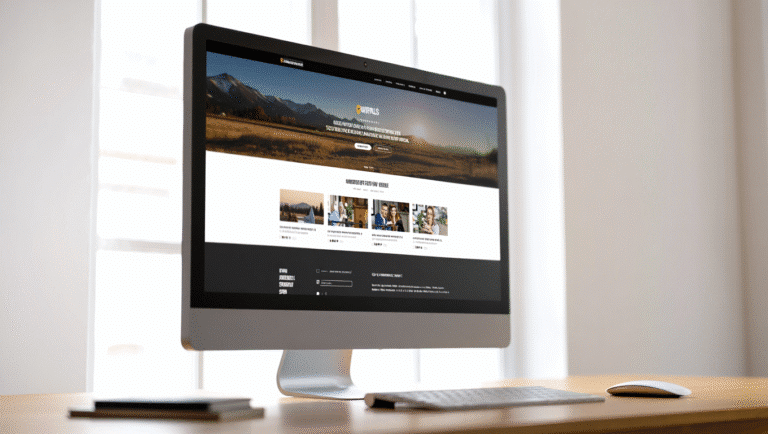In today’s digital-first world, having an online presence is essential for small businesses to thrive. Whether you’re running a boutique, a consulting agency, a bakery, or a local service company, a website acts as your virtual storefront. But when it comes to creating small business websites, the first question many entrepreneurs ask is: which website builder should I use?
With dozens of website builders and site platforms available, it can be overwhelming to choose the right one. This guide will help you navigate the most popular options and understand the pros and cons of each, so you can find the best match for your business needs.
Wix: Flexibility with a Visual Twist
Wix has carved out a significant reputation as a versatile drag-and-drop website builder. It’s particularly appealing for small businesses looking to design beautiful, customized websites without writing a single line of code. With hundreds of templates, a user-friendly interface, and a vast app market, Wix offers a powerful toolkit for entrepreneurs.
The primary strength of Wix lies in its creative freedom. You can position elements exactly where you want them on the page, which is great for businesses with a unique brand style. It also includes tools for SEO, eCommerce, and even appointment booking.
However, this flexibility comes at a cost. Once you choose a template, you can’t switch it without rebuilding your site. The editor can also become overwhelming with too many options. Additionally, Wix’s reliance on third-party apps can sometimes lead to bloated load times, which may affect performance.
Squarespace: Sleek Design Meets Simplicity
Squarespace is often the go-to website builder for creatives and design-focused businesses. It’s ideal for small businesses that prioritize aesthetics, such as photographers, interior designers, and artisan shops. Its beautifully crafted templates, fluid layouts, and clean typography are what set it apart.
The platform offers integrated eCommerce, blogging, and analytics tools, along with excellent mobile responsiveness. The interface is intuitive, though slightly more rigid than Wix. This structure can be beneficial for users who want a consistent look across pages without micro-managing every detail.
However, the simplicity that makes Squarespace attractive can also feel restrictive for advanced users. Customization options are somewhat limited unless you know CSS. While it’s a solid all-in-one platform, the lack of third-party app integrations compared to competitors might leave some businesses wanting more.
WordPress.com: The Power of Blogging and Content
WordPress.com is the hosted version of the popular WordPress.org platform and provides a beginner-friendly way to harness the power of WordPress for small business websites. It’s an excellent option for content-heavy businesses like bloggers, consultants, and educators.
The strength of WordPress.com lies in its content management capabilities. It supports blogs, portfolios, static pages, and more. With a range of themes and a solid free plan, it offers a low-cost entry point for businesses testing the digital waters.
Yet, WordPress.com has its drawbacks. Full customization and plugin support are locked behind premium plans. This limits the flexibility that many associate with WordPress. For businesses looking for maximum control and scalability, WordPress.org (the self-hosted version) might be a better long-term solution.
Shopify: Built for Selling
Shopify is one of the best site platforms for small businesses focused exclusively on eCommerce. Whether you’re selling physical products, digital goods, or subscriptions, Shopify provides everything you need to run a full-fledged online store.
From inventory management and secure checkout to marketing tools and abandoned cart recovery, Shopify is built with sellers in mind. The platform is reliable, fast, and backed by a robust app ecosystem that lets you expand functionality as your business grows.
However, Shopify’s strong suit—eCommerce—can also be a limitation. It’s not the most flexible when it comes to content-focused or service-oriented sites. Additionally, monthly costs can add up, especially when factoring in paid apps and themes. Still, for product-based small businesses, Shopify remains a top choice.
Weebly: Simple and Budget-Friendly
Weebly, now owned by Square, is a beginner-friendly website builder that’s ideal for small business owners who want to launch quickly and affordably. It combines simplicity with essential features like contact forms, image galleries, and basic SEO tools.
The drag-and-drop interface is straightforward and less intimidating than other platforms. For small business websites that don’t require flashy animations or advanced features, Weebly is more than capable of delivering a clean, functional experience.
But the trade-off for simplicity is limited customization. Weebly doesn’t offer the same creative freedom as Wix or the polished design of Squarespace. It’s best suited for small businesses that need a straightforward site without too much fuss.
GoDaddy Website Builder: Speed and Convenience
GoDaddy’s website builder is designed for business owners who need a website up and running fast. It’s part of the broader GoDaddy ecosystem, so if you’re already using their domain or hosting services, the integration is seamless.
The builder emphasizes speed and automation, offering AI-generated templates and content suggestions. It includes marketing tools like email campaigns and social media integrations, making it an appealing all-in-one solution for time-strapped entrepreneurs.
However, the trade-off is less design flexibility and a more cookie-cutter look compared to other builders. If branding and differentiation are a priority for your business, you might find GoDaddy’s builder too restrictive.
Webflow: For the Tech-Savvy Entrepreneur
Webflow occupies a unique space between a traditional website builder and a full web development platform. It’s aimed at users who want pixel-perfect control over their design without diving into deep code—though knowledge of CSS and HTML certainly helps.
Webflow gives small business owners access to sophisticated design tools and CMS capabilities. It’s especially appealing to tech-savvy users and creative agencies who want to stand out with custom interactions and animations.
However, Webflow has a steeper learning curve. It’s not ideal for beginners or those seeking a plug-and-play experience. That said, for businesses wanting complete design control and a developer-grade platform, Webflow is a powerful option.
Zyro: The Underdog with Potential
Zyro is a newer entrant in the website builder scene but has gained attention for its affordability and AI-powered features. It’s a lightweight platform designed to help small businesses get online quickly with minimal effort.
The platform includes AI tools for content writing, heatmaps, and image enhancement. It’s particularly suited for solopreneurs or startups that need a fast, budget-conscious solution without sacrificing too much quality.
While Zyro is improving rapidly, it still lacks the maturity and depth of more established site platforms. The template selection and third-party integrations are limited, but for basic small business websites, it gets the job done effectively.
Choosing the Right Website Builder for Your Small Business
The best website builder for your small business ultimately depends on your specific goals, technical skill level, and budget. If you want artistic freedom, Wix is a strong contender. If you’re focused on clean design, Squarespace could be your match. For full-scale eCommerce, Shopify is hard to beat, while Webflow appeals to those who value precision and customization.
It’s also worth considering the long-term growth of your business. Some site platforms offer more scalability and customization than others. Think about where you want your website to be in a year or two—not just today.
Final Thoughts on Small Business Website Builders
Launching a website is one of the most important steps a small business can take in establishing credibility and reaching new customers. With so many website builders available, there’s truly a platform for every type of entrepreneur. Whether you need a sleek portfolio, a robust online store, or a simple informational site, the right builder can empower you to grow your business online—without breaking the bank or hiring a developer.
As the digital landscape evolves, these tools continue to improve, offering better design, more features, and easier user experiences. So take the time to explore your options, test out free trials, and choose the platform that aligns best with your vision. Your perfect website is just a few clicks away.
Also Read: WordPress Coding Standards: Writing Clean & Secure Code







